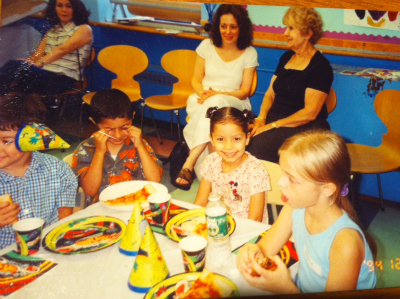« Prev Next »
For centuries, the world has been fascinated with twins. Their distinct resemblance, shown in their appearance, personality, and almost 100% equal DNA still puzzles scientists today. Scientists don't know everything (yet), and that includes some aspects of twins (that's why they are so interesting.) But, this post isn't about identical twins, the ‘human clones'; today you will read about the unalike, fraternal twins---and why they look different. For those who think fraternal twins were born at college fraternity parties and grow up to be the life of the party, don't get your hopes up!

This is a picture of me and my twin brother.
Though fraternal twins are together even in the womb, they are as genetically alike as any other normal brother and sister. That is, they don't necessarily share the exact same features as their twin, like most identical twins do. The reason for this difference occurs before twins even start forming in their mother's uterus, but goes back to when she releases her egg(s) from the ovary.
If you're reading this blog post, you may or may not know about the birds and the bees...I don't know if you do. Yet, I'm going to skip over the details, and go straight to the fertilization process. This process leads to the reproduction-- the creation--of you and me!
Step 1)The mother releases her contributing set of DNA, 23 chromosomes that make up who we are, in an egg cell or ovum.
Step 2)The ovum is fertilized by a sperm cell, the father's (genetic reproducing element), and becomes a fertilized egg or zygote. This zygote contains 46 chromosomes that determine your DNA.
STOP HERE! In case you just skimmed through all of that, this is probably the most important part of this post. If you don't have time to read this whole post, you will find out its main idea here:

Step 3) Monozygotes and Dizygotes:
Now you must be wondering how this relates to you. Well, if you are a singleton, or a baby born by yourself, then you usually grow from ONE fertilized egg. This is not the case with twins. Identical twins come from a zygote that divides in half after fertilization, making it one (mono) fertilized egg (zygote). Yaddy-yaddy-yah, scientists don't know why the zygote of monozygote twins splits. However, fraternal twins are dizygotic, meaning the mother released two eggs instead of the one she is supposed to release, and each egg is fertilized by a different sperm.
The end result is fraternal twins that make up 2/3 of all twin pregnancies. Each fraternal twin has a different genetic makeup or code that, like a manual, will provide the information that determines what they will grow up to look like, think like and some say even act like.
Okay, let's recap. I said that singletons usually develop from one zygote, right? Well, wouldn't it seem odd that the mother releases two eggs instead of one? Dizygotic twins are more prevalent (appear more often) than monozygotic twins. One of the main contributing factors is the use of fertility treatments. Fertility drugs are used for women who cannot ovulate. The drugs enable the woman to ovaluate and then the egg(s) released gets fertilized normally or by in vitro fertilization. During the in vitro fertilization process, the mother's egg(s) is fertilized by sperm outside the body. In addition, the mother's ethnicity and age contribute, too. Most notably, fraternal twins are most prevalent (90%) among the Yorubas of western Nigeria, with a birth rate of 45 per 1000 births. Worldwide, the birth rate is 4 incidences per 1000 births. If the mother is 40 years or older, the frequency of having twins increases. Yet because of today's modern discoveries, like that of fertility treatments, the prevalence of twins has been rapidly increasing since 1970.
Twins in general are literally friends since birth, especially my twin brother Ali and I. He is an hour and seven minutes older than me, and my mother says that as newborns we each showed concern when our twin was crying, as opposed to ignorance expressed towards other newborns at the hospital.
Twins today are very significant in many scientific studies that look at our genes and, for example, compare what we receive from our parents versus how our environments affect us. That's why they are important, besides being human beings.
In a later post, I'll address the mystery of identical twins! Write your comments, suggestions and/or thoughts below. I'll start the discussion by asking: Why you think studies of twins can contribute to genetics research? What discoveries were made from these studies?
Image credit: Trlkly (via Wikipedia Commons)
References:
"Multiple births." Magill's Medical Guide, 4th Rev. ed.. December 1, 2008.
"Fertility Drugs." WebMD Medical Reference.
Fletcher, G. "Multiple Births." July 8, 2009.
Cassill, K. (2011) Twins. The New Book of Knowledge. Grolier Online.























http://www.nigeriansinamerica.com/vbulletin/archive/index.php/t-6786.html
http://www.webmd.com/baby/tc/multiple-pregnancy-twins-or-more-topic-overview
"Doctors aren’t sure what the exact odds of having identical triplets are, but they have been placed as high as 200 million to one."
http://today.msnbc.msn.com/id/23480276/ns/today-today_people/
Another question:
Does having identical twins pose health issues for either twin?
http://en.wikipedia.org/wiki/Twin
And I was just wondering, is it possible to have identical triplets? How about identical quadruplets?
http://www.natural-pregnancy-mentor.com/fraternal-twins-facts.html
http://www.buzzle.com/articles/fraternal-twins-facts.html
http://www.marchofdimes.com/pregnancy/trying_after35.html
A question for further discussion: Why does the probability of of conceiving fraternal twins intensify as the women becomes older?
http://www.multipletreasures.com/facts-about-fraternal-twins.php
http://www.sciencedaily.com/releases/2010/12/101210112327.htm
http://www.apa.org/monitor/apr04/second.aspx
One very interesting study of twins is the study of Amy and Beth, twins separated at birth in the 1960s and put into completely different households in terms of socioeconomic status and attitude of the adoptive parents. However, Amy and Beth ended up having startlingly similar personality traits despite these differences, bringing to light the concept that growing up in different households greatly affects whom you grow up to be, personality-wise. You can read more here: http://www.nytimes.com/books/first/w/wright-twins.html
This statistics holds only if chances of getting fraternal twins is twice as much as getting identical twins. But is that so?